| Reviews & Columns |
|
Reviews DVD TV on DVD Blu-ray 4K UHD International DVDs In Theaters Reviews by Studio Video Games Features Collector Series DVDs Easter Egg Database Interviews DVD Talk Radio Feature Articles Columns Anime Talk DVD Savant Horror DVDs The M.O.D. Squad Art House HD Talk Silent DVD
|
DVD Talk Forum |
|
|
| Resources |
|
DVD Price Search Customer Service #'s RCE Info Links |
|
Columns
|
|
|
Christmas Television Favorites (How the Grinch Stole Christmas!, Year Without Santa Claus, Frosty and Rudolph and more)
Warner Bros. has gathered together seven classic animated holiday TV favorites and repackaged them in the attractive box set, Christmas Television Favorites. Included here are Dr. Seuss' How the Grinch Stole Christmas!, The Year Without Santa Claus, Rudolph and Frosty's Christmas in July, Rudolph's Shiny New Year, Frosty's Winter Wonderland, 'Twas the Night Before Christmas, and Nestor, the Long-Eared Christmas Donkey. If you have any or all of these titles already on disc, there's no need to purchase Christmas Television Favorites, as all the transfers and extras are exactly the same as previous releases. However, if you're looking for a great Christmas gift for someone special, the Christmas Television Favorites box set is a perfect choice.
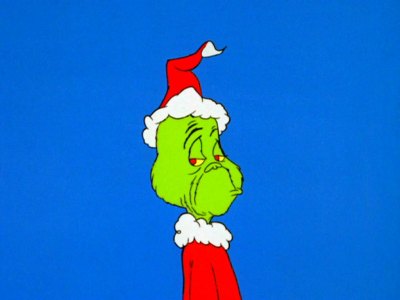
The collection is certainly appropriately titled - Television Favorites - because my generation only knew these through repeated, once-a-year airings at Christmastime. Back during the Stone Age, you had to make sure you cleared it with your old man for him to miss the first half-hour of Ironside, before you could catch one of these classics, or that was it for Rudolph until the next year. Of course today, most kids and even those in their 20s have grown up watching these gems anytime they please, courtesy of those bulky old videotapes and now DVD. I'm quite sure I'm not alone in feeling there was something special in that commonality we all shared before VCRs and DVD players. An upcoming airing of Dr. Seuss' How the Grinch Stole Christmas! was something discussed days before, and talked about and laughed over, as a group, days later. To my little kids, although they love the Grinch, ultimately, it's just another title in their DVD pile, one which they can play at a moment's whim, in an essentially solitary experience.
The Christmas Television Favorites box set contains four discs in a sturdy, book-like, fold-out case, so let's look at the individual shorts on each disc:
DISC ONE:
DR. SEUSS' HOW THE GRINCH STOLE CHRISTMAS!
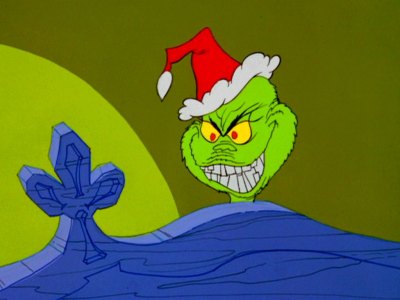
By this point, what else can be said about this timeless, thoroughly brilliant classic? The solitary rival to the Rankin/Bass monopoly on Christmas TV favorites, Dr. Seuss' How the Grinch Stole Christmas! is that exceedingly rare example of a "kiddie" short that is equally satisfying to adults. Facing the daunting task of adapting Dr. Seuss' primal, almost scary children's book (didn't you used to just get lost in those oversized pages, with the spidery, shadowy black and white illustrations from his books?), Looney Tunes genius Chuck Jones puts his own personal stamp on the source material, creating a twisted, perverse riff on Seuss' character that plays like a very mean, very cruel (and very funny) Daffy Duck take-off. Watching Dr. Seuss' How the Grinch Stole Christmas! now, it's fun to spot all the Looney Tunes visual references, as well as the surprisingly nasty humor (listen to little Max yip every time the Grinch cracks that whip - and he just keeps snapping him).
Dr. Seuss' How the Grinch Stole Christmas! is also that children's rarity where the visuals are matched by the vocal performances - in this case, Boris Karloff's virtuoso take on the narration, and Thurl Ravenscroft singing You're a Mean One, Mr. Grinch. When you realize that it's going to be the Boris Karloff doing the narration, it seems like such an odd choice at first; his distinctive lisp and British lilt would seem outsized for the project, throwing the balance off for the viewer who may be distracted by the odd mix of Looney Tunes cruelty and Universal horror. But as we know now, one can't imagine Dr. Seuss' How the Grinch Stole Christmas! without Karloff (a fact that many purists held against the live-action version). A natural born storyteller, Karloff is so ingenious with his little verbal twists and turns, that one can just listen to the short, without actually watching it, and get an enormous amount of pleasure out of it. While Rankin/Bass' equally brilliant (for entirely different reasons) Rudolph, the Red-Nosed Reindeer may be the all-time sentimental favorite of animated holiday classics, Dr. Seuss' How the Grinch Stole Christmas! is certain to remain the over-all most popular one.
The DVD:
The Video:
The full frame, 1.33:1 video transfer used for Dr. Seuss' How the Grinch Stole Christmas! is the exact same one used for the previous 50th anniversary release. Restored to pristine perfection (I didn't see one screen anomaly), the electric, primary color scheme jumps right out at you.
The Audio:
The Dolby Digital English mono is big and fat, with crystal clear dialogue heard throughout. French and Spanish mono versions are also available. Close-captioning is offered, but no subtitles.
The Extras:
As with the 50th anniversary edition, the 1970 Chuck Jones/Dr. Seuss effort, Horton Hears a Who is included (which is skillfully animated, but which doesn't pack the self-contained punch of The Grinch). As well, all the extras included in that anniversary DVD release are here, including Dr. Suess and the Grinch - from Whoville to Hollywood, a brief but informative take on the short's production; Songs in the Key of Grinch, which looks at the scoring of the short; a Making of... featurette that TNT produced some years back, hosted by the late Phil Hartman; some Pencil Tests that may be off interest to animation buffs; text bios on the cast and crew, and some trailers for other Warner kiddie shows.
Final Thoughts:
Still the single most popular animated holiday offering, Dr. Seuss' How the Grinch Stole Christmas! is a brilliant mixture of Dr. Seuss' wonderfully playful storytelling, and Looney Tunes cruelty, courtesy of Chuck Jones. I don't see how it will ever dim in popularity, and the presentation here on DVD is flawless.
DISC TWO:
THE YEAR WITHOUT A SANTA CLAUS
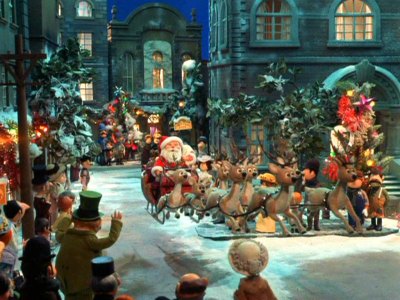
Certainly among the three shorts gathered together on this particular disc, The Year Without Santa Clause is best remembered today (it even inspired an execrable live-action remake last year), with its two main supporting characters, Heat Miser and Snow Miser, becoming genuine icons of young children's Christmas memories. As I'm sure you remember, in The Year Without a Santa Claus, Santa (voice of Mickey Rooney) wakes up one morning with a cold, and after listening to his crotchety doctor, agrees that there's no longer any Christmas spirit, and decides to cancel the holiday. After tucking the depressed Santa back into bed, Mrs. Claus (voice of Shirley Booth) instructs elves Jingle and Jangle (voices of Bob McFadden and Bradley Bolke) to travel to Southtown, U.S.A. to try and find some evidence of Christmas spirit to bring back, to convince Santa he's still loved and needed. Baby reindeer Vixen is called into service to ferry them down south.
Mrs. Claus spills the beans to Santa about her plan, and he immediately sets off to rescue the group, knowing that the Heat Miser and Snow Miser (voices of George S. Irving and Dick Shawn), who guard the way back between the North Pole and the rest of the world, can be formidable obstacles. Down in Dixie, the trio run into trouble. The children don't believe in Santa any longer, and Vixen is locked up in the dog pound. It's up to Santa to rescue Vixen, and it's up to Mrs. Claus to persuade Mother Nature (voice of Rhoda Mann) to convince her two quarreling boys to let it snow in Southtown, while having a nice spring day at the North Pole (why, you may ask? Well...watch and find out).
The Year Without a Santa Claus always seemed like a near-miss Rankin/Bass effort to me. Based in part on the celebrated short story by Phyllis McGinley, The Year Without a Santa Claus has all the ingredients of the traditional Rankin/Bass holiday special: clever, sweet songs, charming stop-motion "animagic" animation, a simple, clear storyline, and some top-flight voice work from veteran pros. It all comes together quite well, but somehow I always feel that the center is diffused by too many characters going off on their own missions. Santa comes to Southtown; Mrs. Claus visits the Miser Brothers and Mother Nature, Jingle and Jangle travel also to Southtown, and non-believer Ignatius (voice of Colin Duffy) follows them all around. It's not that any of the individual parts don't work; it just never feels like a single, whole, contained piece. Perhaps that's why the Miser Brothers are so well remembered from the show, but the remaining characters and story elements, as well as the title song, aren't. Still, The Year Without a Santa Claus is entertaining, with a sweet story that young children still respond to over thirty years after its original broadcast.
RUDOLPH'S SHINY NEW YEAR
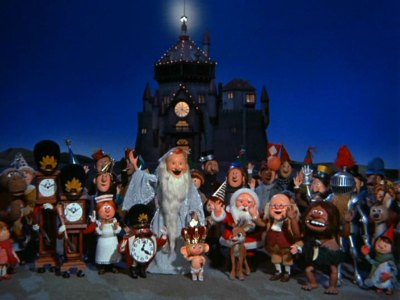
For Rudolph's Shiny New Year, Red Skelton is heard as old Father Time, who sends a message to Santa (voice of Paul Frees) that the Baby New Year is missing. Santa, seeing how dark and snowy and foggy it is outside, decides that Rudolph (voice of Billie Mae Richards) is the only one who can go to Father Time, and find out how to track down Baby New Year. Clued in by Father Time that the Baby New Year ran away because everyone was laughing at his enormous ears, Rudolph goes to the Archipelago of Last Years to find the runaway, aided by various friends including knight Sir Ten-to-Three (voice of Frank Gorshin), caveman One Million (voice of Morey Amsterdam), "Big" Ben Franklin (voice of Harold Peaky), and General Ticker (voice of Paul Frees). But can the group get past the evil Eon (voice of Paul Frees), the vicious buzzard who hopes to live forever by kidnapping the Baby New Year?
Much like the similarly structured Here Comes Peter Cottontail, Rudolph's Shiny New Year relies on the lead character, Rudolph (cannily worked into this non-Christmas story), going on a journey through time to correct an upcoming event. It may champion a holiday that doesn't mean much to young children ("Um...no presents? I'll pass."), but Rudolph's Shiny New Year is suitably low-level surreal to keep your interest through its running time, even if some of the songs are too depressingly morbid and contemplative (Turn Back the Years) for a fun, upbeat holiday "animagic" special.
NESTOR, THE LONG-EARED CHRISTMAS DONKEY
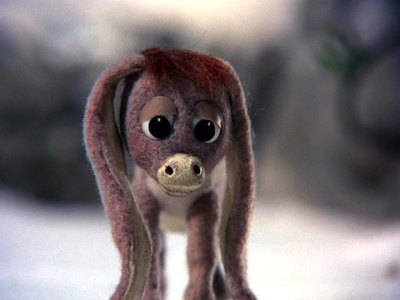
Speaking of depressing, don't let your kids watch Nestor, the Long-Eared Christmas Donkey if they cried during Bambi or Dumbo. Telling the story of the little donkey who carried Mary to Bethlehem, Nestor, the Long-Eared Christmas Donkey starts out marvelously, with the dolefully-voiced Roger Miller perfectly suited to voicing Speiltoe, Santa's donkey (yes - Santa has a donkey, apparently). Recounting his ancestor Nestor's part in the Nativity scene, Speiltoe flashes us back to those ancient times when Nestor was the butt of jokes in Olaf the donkey breeder's stable. Evidently, Nestor's extra-long ears puts him in company with Rudolph's shiny nose and Baby New Year's huge ears, engendering the mocking cruelty of his fellow animals.
When the rest of the donkey's are taken away by Roman soldiers, Nestor is thrown out of the stables in a snowstorm, with his mother escaping to help him. She shields him through snowstorm, but dies of exposure the next morning, leaving little Nestor all alone. A cherub named Tilly (Brenda Vaccaro) inspires Nestor to follow a star, informing Nestor that his life is meant for a very special purpose. Soon, Nestor is chosen by Mary and Joseph to carry her to Bethlehem, and Nestor becomes a hero to the other animals.
Nestor, the Long-Eared Christmas Donkey is a fairly violent little Rankin/Bass production (watch how many times Nestor gets tossed around by Olaf), and a rather sad one, too, with the death of Nestor's mother a big downer for kids who just wanted to see some puppets walking around. Miller is particularly funny in the opening scenes, shaking his head and rolling his eyes when he mournfully intones, "But you know them elves," when he's describing how they won't fix the donkey toy in the stable manager set-up. It's a speedy entry, running only about 23 minutes, but with so many elements lifted from other stories, along with the sometimes downbeat story elements, it's not surprising that Nestor, the Long-Eared Christmas Donkey is one of the less popular Rankin/Bass Christmas offerings.
The DVD:
The Video:
The full screen, 1.33:1 video transfers for the three films included on this disc show absolutely no differences in color, image clarity, or evidence of any digital clean-up of screen anomalies, from previous DVD releases. The films do look very good, though, with bold, true color values and no compression issues to speak of.
The Audio:
The Dolby Digital English mono audio mix accurately recreates the original broadcast presentations of the three shorts. English subtitles are available.
The Extras:
Two new featurettes are included here on the The Year Without a Santa Claus: Deluxe Edition disc. First up is a 16:27 minute documentary, We Are Santa's Elves, which gives a brief, affectionate look at the Rankin/Bass producers and their work. Interviewees include historian Rick Goldschmidt, artists Don Duga and Paul Coker, Jr., actors Rhoda Mann and Bradley Bolke, composer Maury Laws, and Arthur Rankin, Jr. himself. Next, we have Stop Motion 101, which features legend Ray Harryhausen (who never specifically refers to the Rankin/Bass productions being discussed) and effects artists Charles, Stephen, and Edward Chiodo, who give some info on the "animagic" process. It runs 9:32, and there's not much in it that the average movie fan doesn't already know about stop-motion.
Final Thoughts:
A near-miss for Rankin/Bass, The Year Without a Santa Claus still has plenty going for it - the Miser brothers are still pretty cool - while the additional two films on this disc are sure to please the kids.
DISC THREE:
FROSTY'S WINTER WONDERLAND
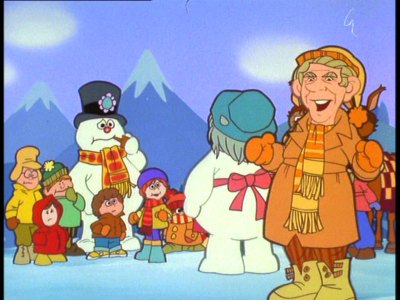
Narrated by Andy Griffith, Frosty's Winter Wonderland tells the story of Frosty's (Jackie Vernon) return to all his friends south of the North Pole, once the first big snowstorm of the season arrives. There, he still enjoys playing with his friends, but soon, Frosty becomes sad because he's often left alone, particularly at night, when all the kids return home. Hoping to solve the problem, the children promise they'll make Frosty a wife, creating Crystal (Shelley Winters) out of the newly fallen snow. But she's lifeless without a little bit of magic, which Frosty provides with a gift of love: a bouquet of snow flowers he quickly makes. When Frosty asks Crystal to marry him, Parson Brown (Dennis Day), a snowman himself, is made to marry the chilly couple. But danger looms for Frosty and Crystal, because Jack Frost (Paul Frees) is jealous of Frosty's fame and the love he receives from all the children. And so he decides to steal Frosty's magic hat, and return him to just a plain, ordinary, inert snowman.
Of course it's great to have the gentle-voiced Jackie Vernon back as Frosty, and Dennis Day adds a touch of Yuletide cheer with his sterling voice, but I was most pleased with Andy Griffith's inclusion in the Rankin/Bass world. He's a perfect choice for this kind of voice work. Griffith, a natural-born storyteller who first shot to fame doing comic monologues, is marvelously free and easy with his narration, bringing a lot of oomph and energy to his line readings. He also gets to sing a few songs, and if you've ever heard him sing on The Andy Griffith Show, you know what a pleasant voice he has. Shelley Winters - if you can believe it - is actually subdued here. As a huge fan of this underrated actress, I'm not sure I want a subdued Shelley Winters, but she does manage a girlish, sweet delivery that fits the character. The story is logically set out, and it moves swiftly from song to song, while the animation is wonderfully evocative of that later Rankin/Bass house style (I love the heavy outlines on the characters). A charming, effective sequel.
'TWAS THE NIGHT BEFORE CHRISTMAS
Another Rankin/Bass traditional animation short that often gets overlooked, 1974's 'Twas the Night Before Christmas takes just a kernel of an idea from the famous poem by Clement Clarke Moore ("'Twas the night before Christmas, when all through the house, not a creature was stirring, not even a mouse."), and expands it into a charming little story of Father Mouse (George Gobel) and Joshua Trundle (Joel Grey), a clockmaker, who must find a way to bring Christmas and Santa back to Junctionville. Evidently, someone wrote a letter to the town paper, denouncing Santa as a fake, which got back to Santa, who returned all of the town's letters to him, unopened. Father Mouse figures out that his egg-head son Albert (Tammy Grimes) is the culprit, and, with Joshua, devises a plan for the clockmaker to fashion a huge clock which will play a song to Santa, letting him know that the town still cares about him. But Albert inadvertently messes up the clockworks, and no one knows for sure if Santa will arrive Christmas Eve night.
While the animation for 'Twas the Night Before Christmas may not be the best example of Rankin/Bass' art, the simple, effective songs included in the short are entirely in keeping with their successful track record. Maury Laws' Give Your Heart a Try and Even a Miracle Needs a Hand are lovely, and help put this minor effort over. The story may not be as artfully constructed as others in their canon, but the voice work is quite good (it's nice to hear Gobel's singing voice again), and the simple message - believe, and do what your heart tells you to do - won't hurt any child who hears it.
The DVD:
The Video:
The full-frame, 1.33:1 video transfers for both films are quite good here, although print damage is noticeable in both, particularly in 'Twas the Night Before Christmas (which at times looks a bit rough, with numerous scratches and print anomalies). Still, these look quite good, with correct color values and no compression issues.
The Audio:
The Dolby Digital English mono track accurately reflects the original broadcast presentation. Close-captioning is available.
The Extras:
There are no extras for this particular disc.
Final Thoughts:
Frosty's Winter Wonderland and 'Twas the Night Before Christmas, two Rankin/Bass traditional animation shorts that often get overlooked, are quite charming and light, with excellent vocal work and some lovely songs, to put them over nicely.
DISC FOUR:
Rudolph and Frosty's Christmas in July
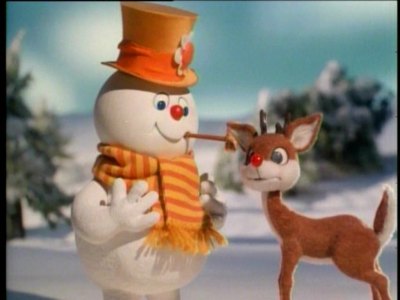
The only clunker in the Christmas Television Favorites collection, 1979's Rudolph and Frosty's Christmas in July is a largely unsuccessful attempt to mix two beloved Rankin/Bass holiday fixtures - Rudolph and Frosty the Snowman - and graft them onto a Fourth of July storyline that's as convoluted as it is unpleasant. Apparently, Rudolph got his shiny nose from Lady Boreal, who ruled over the North Pole before Santa came, and in opposition to the evil Winterbolt (Paul Frees). Rudolph was given his magical nose to aid Santa through one of Winterbolt's evil schemes; for his crime, he was put into a deep sleep by Lady Boreal. But he has now awakened, and he plans on taking out Rudolph (Billie Mae Richards) and Santa (Mickey Rooney), and he's going to use Frosty (Jackie Vernon) as the patsy.
Knowing that Frosty wants to help out Milton (Red Buttons) the ice cream salesman, marry Laine Lorraine (Shelby Flint), Winterbolt offers to give Frosty, his wife Crystal (Shelley Winters) and their children special crystals that will stave off melting. You see, Frosty wants to take Rudolph down to Laine's mother's circus, where a big draw is needed to keep the circus in Lily Loraine's (Ethel Merman) hands. But Winterbolt has no intention of letting Frosty or his family stay frozen. He rigs it so they'll stay past the July Fourth fireworks (when the crystals wear off), and gets Scratcher (Alan Sues), a mangy reindeer fired by Santa, to implicate Rudolph in a crime (stealing the circus' receipts), so his noselight will go out forever. Will our heroes save the day?
You can't really blame Rankin/Bass for trying to branch out and hit the other holidays with their stop-motion efforts, but the obvious, clumsy grafting of Christmas favorites Rudolph and Frosty, onto the Fourth of July just doesn't work. The plot is entirely too clunky and busy for little kids to appreciate, and most of the characters sound and act like rip-offs from other Rankin/Bass efforts (Winterbolt is Winter Warlock; Milton is Fred Astaire's postman from Santa Claus is Comin' to Town). What's more, the basic notion of not only adding a totally superfluous back story to Rudolph's red nose (hey - I thought he was just born with it?), along with the scurrilous notion of Rudolph committing a crime (I know he didn't, but little kids don't get that subtly), is really beyond the pale. Worst of all, the songs are sub-par (not to mention some of the celebrity warbling, as well. I love the Merm, but she's way off her game, here). Justly obscure, this later Rankin/Bass effort is a big misfire.
The DVD:
The Video:
Rudolph and Frosty's Christmas in July looks quite bad here, with a seemingly second or third generation transfer that mutes the color, ups the video noise, and creates a soft picture.
The Audio:
The Dolby Digital English mono audio track is thin and unremarkable, but accurately recreates the original broadcast presentation. Captioning is available.
The Extras:
There are no extras for Rudolph and Frosty's Christmas in July.
Final Thoughts:
A misfire from the get-go, Rudolph and Frosty's Christmas in July pairs up two Christmas favorites for a fizzle of a Fourth of July celebration. The story is too complex for little kids, and the notion that Rudolph's magic nose has to be explained - as well as showing him as a criminal (even though he didn't do it), is something no kid needs to see.
Final Thoughts on the Box Set:
If you don't already have these terrific holiday animated classics on DVD, the Christmas Television Favorites is an excellent way to start your collection. With its sturdy, nicely turned-out package, it would also make a terrific Christmas gift for someone special. But if you already have these favorites on DVD, you don't need to double-dip here; all the transfers and extras are carried over from previous releases. I highly recommend the Christmas Television Favorites collection.
Paul Mavis is an internationally published film and television historian, a member of the Online Film Critics Society, and the author of The Espionage Filmography.


|
| Popular Reviews |
| Sponsored Links |
|
|
| Sponsored Links |
|
|
| Release List | Reviews | Shop | Newsletter | Forum | DVD Giveaways | Blu-Ray | Advertise |
|
Copyright 2024 DVDTalk.com All Rights Reserved. Legal Info, Privacy Policy, Terms of Use,
Manage Preferences,
Your Privacy Choices | |||||||














